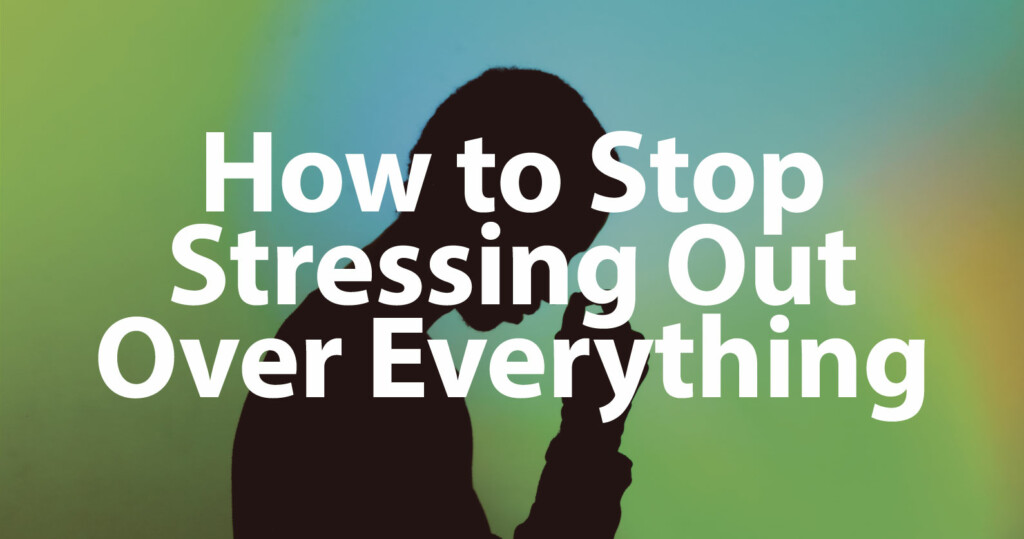
There are some seemingly blessed people out there who seem to float through life without a worry in the world. It may seem on the outside as if they are living this care-free lifestyle where nothing goes awry, but in truth, we all have something to worry about – some people have simply worked out their own stress management and how to stop stressing out.
Why you must learn how to stop stressing out over everything
Picture this: It’s a beautiful crisp morning, the birds were singing and the sun was shining – another glorious day. But, you’re late for work! Your alarm clock decided it forgot how to function so you woke up late. But that’s not all, you forgot to switch your car’s lights off and your battery ran dry and now you’re stuck in the traffic. As each minute ticks by and you’re still idling, the traffic flow stagnant, you start to feel those prickly feelings in your fingers, your palms start to sweat, your heart rate starts racing and you feel panic take over. Even though this is a natural response your body possesses, going through high-stress levels every day is unhealthy for our bodies. This is only one example of a cause of stress but our busy, modern-day lives are full of triggers ready to take their toll. From feeling worried about our loved ones, disputes with coworkers, being diagnosed with an illness, or losing a friend. This article will help you learn how to stop stressing out about everything so you can focus on your well-being.
 As mentioned above, stress is a natural body function designed to help you cope with certain stressful situations. Your central nervous system calls upon your fight-or-flight response and your hypothalamus releases a hormone called cortisol from your adrenal glands which are commonly known as the stress hormone. If your lifestyle is full of stressors and you are living in a heightened state of stress you are indirectly putting your health at serious risk. Stress can reduce the efficiency of your immune system, reproductive system, digestive system, and pretty much every other system in your body. This can cause high blood pressure, put you at risk of heart attacks or strokes, and more. It can even have a long-lasting impact on your mental health, leaving you struggling with anxiety and depression. If you are experiencing any of these issues, we strongly suggest you seek out any medical advice. For now, however, we shall provide some pointers for you to avoid the previously mentioned symptoms.
As mentioned above, stress is a natural body function designed to help you cope with certain stressful situations. Your central nervous system calls upon your fight-or-flight response and your hypothalamus releases a hormone called cortisol from your adrenal glands which are commonly known as the stress hormone. If your lifestyle is full of stressors and you are living in a heightened state of stress you are indirectly putting your health at serious risk. Stress can reduce the efficiency of your immune system, reproductive system, digestive system, and pretty much every other system in your body. This can cause high blood pressure, put you at risk of heart attacks or strokes, and more. It can even have a long-lasting impact on your mental health, leaving you struggling with anxiety and depression. If you are experiencing any of these issues, we strongly suggest you seek out any medical advice. For now, however, we shall provide some pointers for you to avoid the previously mentioned symptoms.
 11 best ways to stop stressing out so much
11 best ways to stop stressing out so much
I now ask you to set aside all preconceived ideas of stress management. This is not a time to break out the booze, start smoking or avoiding the stressor altogether.
1. Don’t over-crowd your schedule
In this modern world, we live in, we can quite easily find ourselves stuck in a rut of stress. It is important not to facilitate this stressful lifestyle by giving yourself too much for yourself to handle as one person. It is okay to say “no” occasionally or to delegate errands. This also includes asking our partner or housemate to do the grocery shopping from time to time.
2. Release control
It is a hard concept for some of us to grasp that we are not in control of everything in our lives. There are a lot of external influences that negatively impact us. In order to not stress out about that we need to relinquish that urgent need to control that which we cannot, and rather focus on what we can, like our reactions.
3. Change your reaction
 An example of this is when a teacher is trying to get her classroom of seven-year-olds on a sugar rush to sit down and listen. It is likely to cause stress because it is inevitable for the children to behave this way after all the sugar. The teacher cannot control the boisterous children but she can control how she reacts to them. This brings back strong memories of my first-grade teacher standing at the front of the class, patiently waiting with her index finger on her lips as a sign to be quiet… we eventually caught on.
An example of this is when a teacher is trying to get her classroom of seven-year-olds on a sugar rush to sit down and listen. It is likely to cause stress because it is inevitable for the children to behave this way after all the sugar. The teacher cannot control the boisterous children but she can control how she reacts to them. This brings back strong memories of my first-grade teacher standing at the front of the class, patiently waiting with her index finger on her lips as a sign to be quiet… we eventually caught on.
4. Don’t be afraid to ask for help
Occasionally our brains are too big for our bodies and there is not enough time in the day to complete all the tasks you have set yourself up to do. Our family, friends, and coworkers are not likely to leave you in the lurch if you say you need help. It does not mean you have failed, or that you are insufficient. Your resources will increase your resistance. Feeling stressed out can make your brain foggy and the situations can seem too confusing which can make it difficult to ask for help for something even you don’t understand fully. Your peers can help you even by just listening. Saying things out old can sometimes help things fall into place in your head, or maybe your friends and family can understand your problem because they are not clouded by emotions. Just reach out to those around you, you might be pleasantly surprised at how willing your loved ones and even co-workers might be to assist.
 5. Make art or journal
5. Make art or journal
Artists and musicians alike have mastered channeling their negative feelings with mindfulness, like stress, depression, and rage into their work. It is a great way to express your feelings without it affecting your life. Art, in any form, can help you reflect on and resolve your problems that may arise in your life. Art comes in many forms so the same can be said for journaling. It is important to write down everything you need to remember but equally important to write down everything you are grateful for. This can remind you that you are not alone and there are people there to help you.
6. Exercise
Literally, any form of physical activity will help improve your fitness levels. Another great plus is that it can also reduce your stress levels. This is mostly because exercise increases your brain’s production of endorphins. Have you ever wondered about that glorious feeling you get after a good sweat session? Well, that high is caused by endorphins which are positive neurotransmitters.
 7. Do yoga
7. Do yoga
Yoga has been practiced as a great stress reliever over many centuries. The mind and body movements can help take your mind off your problems and exist only in the present moment. If practiced consistently.
8. Meditate
Much like yoga, meditation has been around for a while and it can help get you into a deepened state of relaxation. If practiced regularly, meditation will feel more natural and you won’t be met with s much resistance when trying to quiet your thoughts. To begin, take three deep breaths and focus your attention inward. Meditation can clear your brain of the day’s overload of information and stimulations.
9. Breathing techniques
This is one of the most accessible methods to calm yourself in stressful environments. It can be done from anywhere: in a meeting for work, at home when your children are acting crazy, or at the mall during Christmas time. Simply focusing on your breath can have an immediate positive effect. Taking deep, long breaths or short, quick ones, filling into, and expelling from your diaphragm can help oxygen flow through to your brain, clear your thoughts so you can manage your tasks better.
10. Aromatherapy
Even though there are few studies on this concept, aromatherapy has grown increasingly popular as a relaxation technique. We are all too familiar with luxurious spas that exude aromatic scents that tantalize your senses. But there is nothing wrong with store-bought scented candles and oils to burn at your leisure within the comfort of your own home.?
 11. Positive affirmations
11. Positive affirmations
The way in which we speak about and to ourselves is important. If you are constantly berating yourself for every mistake instead of praising your successes it will become harder and harder for you to see it. Negative thoughts will lower your vibration and they can cloud which makes problem-solving difficult. First, identify your negative thoughts and try to change them into positive ones. For example, Instead of being fearful that you might be the only one wearing a short dress for prom, reason with yourself, it’s more than likely there will be other girls in a short dress, and I mean… you have nice legs – show them off.
Key takeaways on how to stop stressing yourself out
We are all so different from one another and our triggers will never be the same as your best friend. It is vital to learn how to stop stressing yourself out in order to live a happier and healthier life w need to put some effort into alleviating our struggles. It may take some trial and error but it is important to find the best method for you. Just remember, you are not alone in this journey.
 Written by:
Written by:
Jade Small
 11 best ways to stop stressing out so much
11 best ways to stop stressing out so much 5. Make art or journal
5. Make art or journal 7. Do yoga
7. Do yoga 11. Positive affirmations
11. Positive affirmations




Leave a Reply
You must be logged in to post a comment.